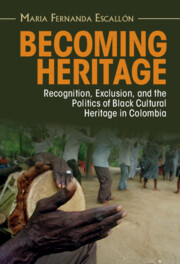Book contents
- Becoming Heritage
- Afro-Latin America
- Becoming Heritage
- Copyright page
- Dedication
- Contents
- Figures
- Preface
- Acknowledgments
- Abbreviations
- Introduction
- 1 A New Framework of Legitimacy
- 2 Institutionalizing Heritage
- 3 Heritage in the Face of Death
- 4 Palenqueras and the Trap of Visibility
- Epilogue
- Bibliography
- Index
1 - A New Framework of Legitimacy
Published online by Cambridge University Press: 06 April 2023
- Becoming Heritage
- Afro-Latin America
- Becoming Heritage
- Copyright page
- Dedication
- Contents
- Figures
- Preface
- Acknowledgments
- Abbreviations
- Introduction
- 1 A New Framework of Legitimacy
- 2 Institutionalizing Heritage
- 3 Heritage in the Face of Death
- 4 Palenqueras and the Trap of Visibility
- Epilogue
- Bibliography
- Index
Summary
This chapter traces the history of heritage making in Palenque. I examine the process by which Palenque was transformed from an anthropological field site in the mid-twentieth century to a site of “Intangible Cultural Heritage of Humanity” in the early 2000s. This chapter highlights the role of academics and their research as it was later used by both Palenqueros and bureaucrats to secure Palenque’s heritage nomination. Although academics did not singlehandedly originate the recognition process, their research, language, and connections contributed to leveraging claims made locally since the 1980s for state support and political rights.
By analyzing how Palenqueros have presented themselves in writing and through guided tours, I show how academic epistemology and language became the legitimizing frameworks for Palenqueros to claim recognition and justify the heritage declaration. An analysis of the language and epistemology of Palenque’s UNESCO dossier reveals that academic scholarship made Palenqueros’ claims legible to UNESCO and the Colombian state. Yet, in so doing, the emphasis on scholarship created a hierarchical distinction that prioritized academic over so-called traditional knowledge. Even as this “expert knowledge” garnered recognition for Palenque, it marginalized community members with less formal academic training and empowered a new class of leaders. I document Palenque’s first type of heritage exclusion through what I call the hierarchization of knowledge, in which the framework used to claim recognition for Palenque’s cultural heritage entrenched hierarchical distinctions among Palenqueros rooted in their unequal access to academic expertise, with both political and economic ramifications.
- Type
- Chapter
- Information
- Becoming HeritageRecognition, Exclusion, and the Politics of Black Cultural Heritage in Colombia, pp. 47 - 82Publisher: Cambridge University PressPrint publication year: 2023



